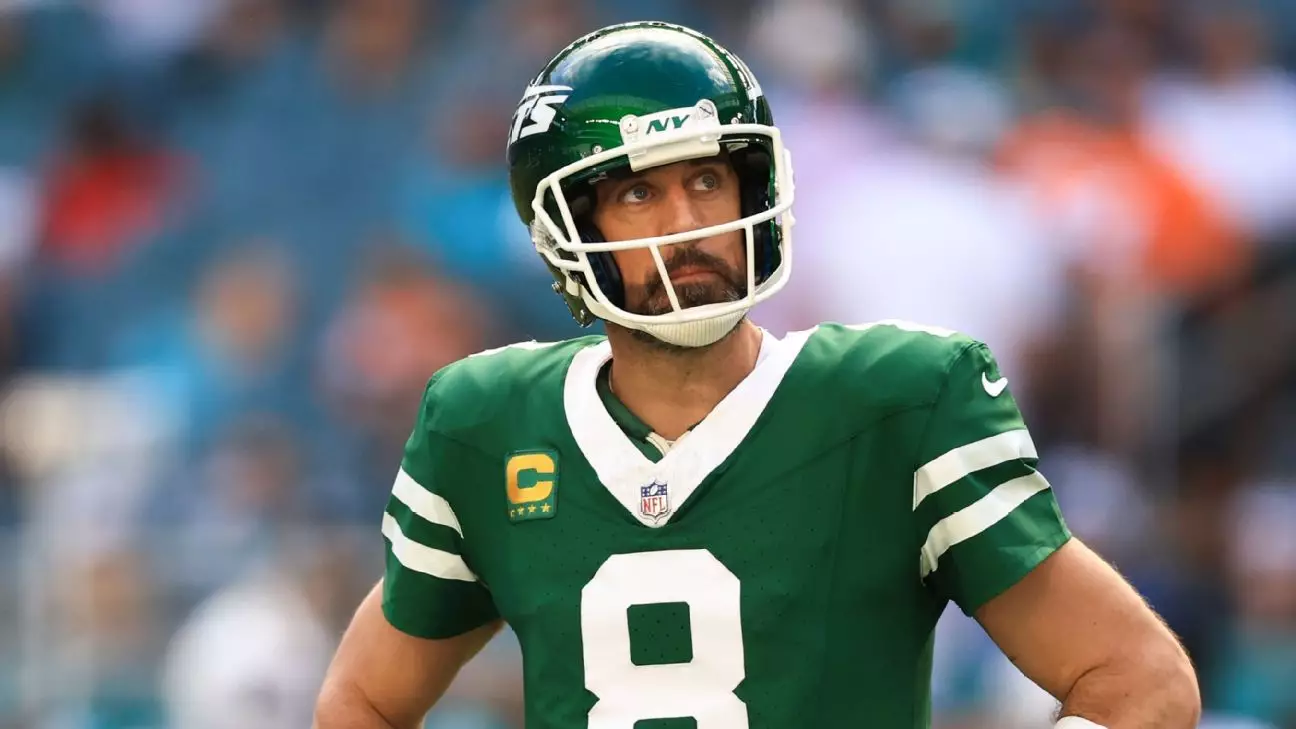The relationship between a franchise quarterback and team ownership can often dictate the trajectory of a football season. In the case of Aaron Rodgers and New York Jets owner Woody Johnson, there seems to be a palpable tension that has surfaced amidst a disappointing season for the Jets. As the Jets prepare for the conclusion of a tumultuous campaign, both players and executives appear to be grappling with the uncertain future, particularly regarding Rodgers’s potential continuation in the green and white.
One of the most striking elements of the current situation is Rodgers’s guarded stance on his future with the team. This past Tuesday, he delivered a curt response to media inquiries about Johnson’s desire to retain him beyond his current contract, which extends until 2025. His inquiry about Johnson’s intentions prompted a terse reply: “You should ask Woody.” This response not only hints at a rift but also underscores a situation in which effective communication appears to be lacking.
The underlying issue seems twofold: the performance limitations Rodgers has faced this season—and his subsequent injury—and the apparent disconnect in expectations between him and Johnson. Despite having the experience and accolades to inspire confidence, Rodgers’s performance has not aligned with the lofty standards set for a player of his caliber. Even as he prepares to play against the Buffalo Bills, he acknowledges that he needs to be “in the plans of multiple people, starting with the ownership” for there to be clarity regarding his future.
Despite Aaron Rodgers’s tenacity and willingness to return to the field, he faces a significant hurdle: a painful MCL injury. As he anticipates what may be his final games with the Jets, his performance has come under scrutiny—not only from the fans but also the ownership and coaching staff. Rumors swirled after Johnson suggested the potential for benching the veteran, leading to a fracture that, understandably, may influence Rodgers’s outlook.
As the Jets grapple with their disappointing record of 4-11, the on-field dynamics have changed drastically since the arrival of wide receiver Davante Adams. While Adams has quickly become a focal point in the Jets’ offense, his presence has inadvertently stifled the opportunities of talented players such as Garrett Wilson. The disparity in involvement among these key contributors further complicates Rodgers’s situation on the field. Wilson, frustrated with his reduced role, emerged as a notable voice within a team that should be focused on cohesion and collective success.
Communication appears to be a significant issue stretching beyond the realm of quarterback and owner to include the broader team dynamics. The relationship between Rodgers and Wilson exemplifies this breakdown. With Wilson acknowledging a desire for more targets amid a season of changing dynamics, it begs the question: Are Rodgers’s priorities aligned with developing the talents of younger players? While both players recognize their immense talents, system and coverage often dictate who receives the ball, further exacerbating on-field frustrations.
With Jets interim coach Jeff Ulbrich advocating for Wilson’s increased involvement in offensive gameplay, this discrepancy can create rifts not only between players but also within the coaching staff. This clash in expectations reflects on the growing urgency of the upcoming decisions facing the Jets’ front office. It raises pertinent questions that ownership must address: how to balance veteran leadership with burgeoning talent and whether to maintain investment in a quarterback grappling with injuries and performance issues.
As the season nears its end, both Rodgers and Johnson face critical choices that may shape their respective legacies. The Jets’ ownership will closely analyze the messaging coming from Rodgers as they contemplate significant roster decisions. Should they choose to part ways with Rodgers, who carries both the burden of high expectations and the weight of injury, they must also consider how that decision impacts team morale and future performance.
The Jets find themselves at a crossroads where relationships, performance, and future direction intertwine. The uncertainty surrounding both Johnson and Rodgers can either lead to a pivotal transformation for the franchise or deepen the fissures that threaten to undermine their ambitions. Regardless of the outcome, it is clear that communication has become a growing concern, with the resolution of these conflicts holding the key to a more productive future for the New York Jets.

